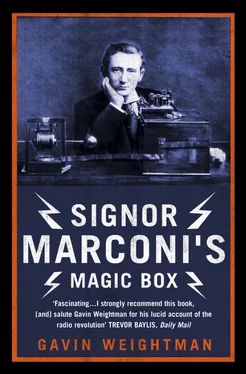Giuseppe had no family other than his in-laws. His father had died, and a brother who became a priest had been murdered by a thief. Annie, on the other hand, had three sisters, all of whom had married and had children. Annie did not lose touch with them despite her elopement. One of her sisters had married an English military man, General Prescott, who was posted to Livorno on the north-west coast of Italy. Annie often took Alfonso and Guglielmo to stay with her, where they enjoyed the company of the Prescotts’ four daughters and the small English community. The English girls were also often Guglielmo’s playmates at the Villa Griffone, and he spent so much time with them and with his mother that at times Italian became his second language.
Annie read the Bible to her sons as part of their English lessons, and appears to have had no interest in science. Of greater interest to Guglielmo than religious instruction was the library in the Villa Griffone, which contained a wide selection of books. It is not clear whether it was Guglielmo’s father or his grandfather who had collected works ranging from Thucydides’ History of the Peloponnesian War to the lectures of the brilliant English chemist Michael Faraday. Perhaps many of the scientific works were provided by or for the young Guglielmo himself; in any case, from the age of about ten Guglielmo began to work his way through this store of knowledge. He became especially interested in the wonderfully lucid lectures of Faraday, who had made some of the most significant discoveries about the relationship between electricity and magnetism, and had invented the first, tiny, electrical generator.
Born in 1791, the son of a blacksmith, Faraday had had no formal education, and began his working life as an apprentice to a bookbinder. He had attended a series of lectures given by the famous scientist Humphry Davy at London’s Royal Institution, made notes on them and sent them to Davy, asking for a job as a laboratory assistant. Davy took him on, and eventually Faraday was to succeed him as the most celebrated scientist in England, spending his life experimenting in a variety of fields, but most signify-cantly on the nature and applications of electricity. He died in 1867, just seven years before Guglielmo Marconi was born. Faraday undoubtedly provided the young Marconi with a heroic model: the scientist alone in his laboratory with wires and chemicals, painstakingly testing his theories. But the greatest hero to descend from the shelves of the Villa Griffone library was the American Benjamin Franklin. Among the many achievements of this extraordinary man, born in 1706, a printer, diplomat and amateur scientist who was at seventy the oldest signatory of the Declaration of Independence, was the invention of the lightning conductor.
In a celebrated experiment, Franklin had flown a kite in a thunderstorm to demonstrate that the electrical charge of lightning could be channelled along a wire to which the kite was tethered. This clearly impressed the young Guglielmo, for his daughter recalls him telling the story of how he and a friend rigged up a lightning conductor in the house they were staying in in Livorno, and prayed for a storm. When one came they were thrilled to discover that their toy worked: at every lightning flash, the electrical charge triggered a little mechanism which rang a bell in the house. A replica of young Guglielmo’s lightning alarm is among a wonderful collection of his early gadgets in the Villa Griffone, which is now a museum devoted to his extraordinary childhood inventiveness.
It was around the time of the lightning experiment, in 1887, when Marconi was thirteen years old, that the German scientist Heinrich Hertz made known his discovery of electro-magnetic waves, prompting the Irish mathematician George Fitzgerald to declare that humanity had ‘won the battle lost by the giants of old … and snatched the thunderbolt from Jove for himself’. This was a humbling statement for Fitzgerald to make, for only a few years earlier he had announced that he believed the artificial creation of electro-magnetic waves was not possible, thereby blunting the ambition of British scientists working along the same lines as Hertz.
Guglielmo did have some academic tutoring at an institute in Livorno and a college in Florence, but his serious work was carried out on his own at the Villa Griffone. He was privileged, for his father not only provided him with a library, but grudgingly subscribed to all the leading scientific journals of the day, which Guglielmo devoured. His boyhood notebooks, rediscovered in Rome only seven years ago, are testimony to his fanatical interest in electricity and all the latest theories and inventions. The scientific community was most excited at the time by the work of Hertz. His apparatus for proving the existence of the Scottish physicist James Clerk Maxwell’s imagined electro-magnetic waves and measuring their ‘length’ was quite crude. A spark was produced by jumping electricity across a gap between two metal balls charged by Leyden jar batteries. The spark generated electronic waves which travelled invisibly across Hertz’s laboratory to activate a ‘receiver’ made up of wires which produced a spark in response. His experiments inspired many other scientists to examine the properties of what became known as Hertzian waves.
In 1894 Heinrich Hertz died at the tragically young age of thirty-six. During an operation for cancer of the jaw he suffered blood poisoning, which killed him. The scientific magazines were filled with obituaries which gave accounts of the trail-blazing experiments he had conducted. When the young Marconi read these he at once conceived the idea of using the apparatus which Hertz had made to send telegraph messages. He did not know it at the time, but precisely the same idea had struck a number of scientists and inventors in England, America and Russia.
A neighbour of the Marconi family at Villa Griffone was the Italian Professor of Physics Augusto Righi, who had done his own work on Hertzian waves. Guglielmo was thus able to discuss his idea with a leading scientist. He received little or no encouragement, but quite probably he managed to get an idea of how to construct the kind of transmitter and receiver Hertz had used in his laboratory, and with the help of his mother he cleared out an area on the upper floor of the Villa Griffone which had been used by his grandfather for keeping silkworms. This home-made laboratory has been lovingly restored by the staff of the modern museum. The beautifully recreated models of his early equipment are testimony to Marconi’s skill, and his dedication to an ambition on which he spent nearly all his waking hours.
By the time Marconi was a teenager there was a widespread interest in electricity, which was reflected in the publication of a range of journals from which the enthusiastic amateur could learn about the very latest theories and discoveries made in Europe and America. The majority of these were in English, and Marconi’s easy command of the language ensured that there were few developments of which he was unaware.
Day after day through the hot summer months of 1895, Guglielmo Marconi climbed the stairs to his makeshift workshop in the attic of the Villa Griffone. He said very little to his family about what he was trying to achieve behind its closed door. Early on he learned to be cautious about making any predictions, and he was very conscious of his ageing father’s view that the whole thing was a waste of time. Being a scientist or an inventor was not, in Giuseppe Marconi’s opinion, a ‘career’, unless, like their neighbour Righi, you had a professorship.
From time to time Guglielmo would allow his English cousins to visit the attic, where he would show them the magic he could perform with crackling sparks which made a bell ring by a mysterious force. He himself could not really explain how these tricks worked. He achieved them by trial and error, making use of every bit of electrical equipment and every published experiment he could lay his hands on. For his electricity supply he could buy batteries. It was also a simple matter to get hold of a Morse key and a Morse printer, for these were mass-produced for the telegraph industry, and there were many models on the market.
Читать дальше












